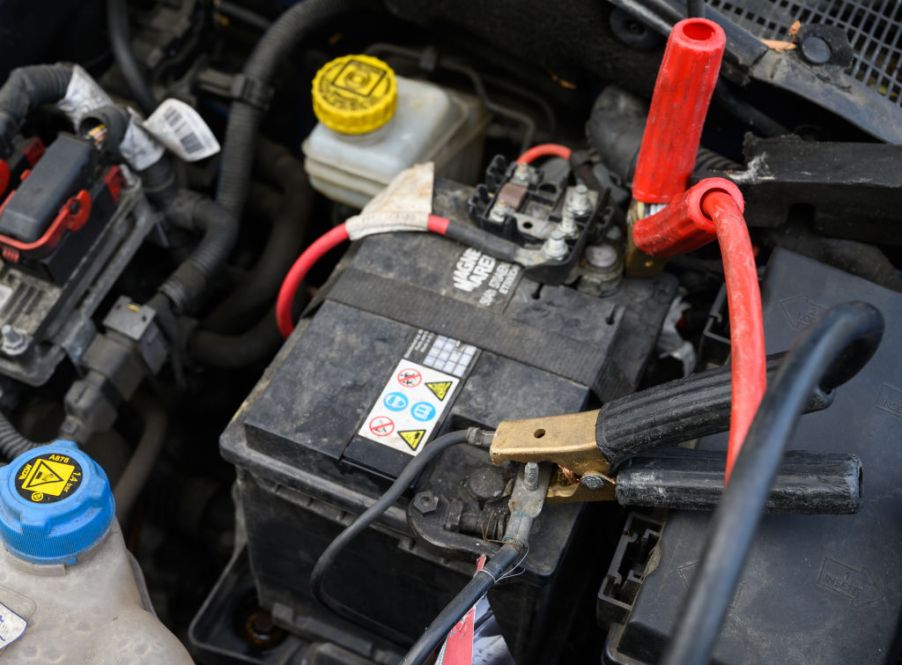
How You Know Your Car Battery Is Really Dead
When your car won’t start, your first reaction might be panic. You might automatically assume the worst.
But before you do that, it’s important to determine if the problem is actually the battery. Your car’s battery works closely with the alternator and starter motor. It can be tricky to learn which is the culprit when your car won’t start.
We’ll discuss what the battery does and how to know when your car battery is dead as opposed to a problem with the alternator or starter, according to LifeWire. We’ll also review what actions to take when your car battery is dead.
What Does Your Car’s Battery Do?
According to NASA, a battery is “a device that translates chemical energy into electricity.” When you put your key into your car’s ignition or push the ‘ON’ button, your car’s battery is sent a signal. On that signal, the car’s battery converts chemical energy into electrical power. That power is sent to the starter that cranks the engine. The battery also runs the car’s lights and other features.
Dead Battery Symptoms
While the indications aren’t identical in each situation, there are some telltale signs that the battery is the reason your car won’t start. If your car is showing any of the following signs, a dead battery may be the culprit.
The interior lights and door chimes don’t launch
The battery powers the interior lights and any chimes so a lack of response can indicate a dead battery. Weak interior lights or sounds can be caused by a weak battery that may have enough juice to bring up the lights but not enough to turn over the engine. However, you should be aware that it could also be a defective fuse or door switch.
No headlights or audio system or dim headlights
If your car won’t start, the headlights don’t work, and your audio system is unresponsive, it’s normally a dead battery. Keep in mind, it could also be eroded battery connections, a defective main fuse, or a wiring issue.
Nothing happens when you turn the ignition key
If you turn the key and nothing at all happens, the car’s battery is likely dead. This is the telltale sign. If the battery isn’t the issue a defective ignition switch, malfunctioning starter, or a bad fusible link could be the culprit.
When you turn the ignition key, you can hear the starter motor but the engine is unresponsive
If the starter motor sounds sluggish or slow and cranks slowly, the batter is likely dead. If it cranks a handful of times and then stops, the battery is probably dead. On occasion, the starter could be the culprit and trying to pull more power than the battery can give it. You may have a fuel or spark issue if the starter motor cranks at normal speed.
You have to jump the car in the morning but later it starts fine on its own
The cause of this could be a parasitic drain that’s emptying your battery overnight. The source of the drain would need to be found or the battery would need to be replaced.
Cold weather diminishes a battery’s ability to immediately power the starter motor, particularly when the battery is older. So if you are in a colder area keep this in mind.
What to Do When Your Car Battery is Dead
The best option for dealing with a dead battery is by jump-starting it if possible. You’ll need a good pair of jumper cables and another car with a functioning battery. Take caution though, because if the battery is visibly leaking acid or it’s cracked, it isn’t safe to jump-start it.
If it’s not possible to jump-start, or you don’t have what you need to do so, call a friend, family member, or roadside assistance for help.
Don’t Neglect a Dead Battery
Never leave a dead battery in your vehicle as it can lead to serious problems. Once the voltage of the car’s battery drops to 10.5 volts, lead sulfates completely cover the lead plates. Eventually, the lead sulfated forms a hard crystal buildup. You can’t break up the build-up with alternator current or a regular battery charger making it important to replace the battery, the sooner the better.


